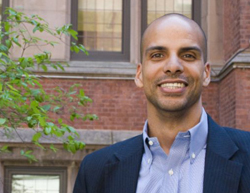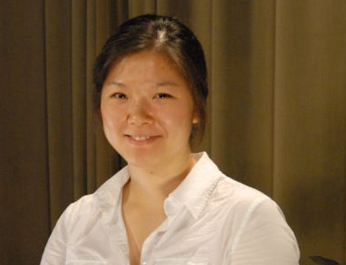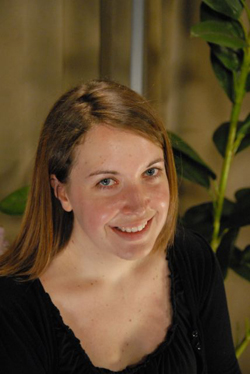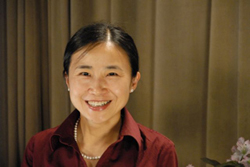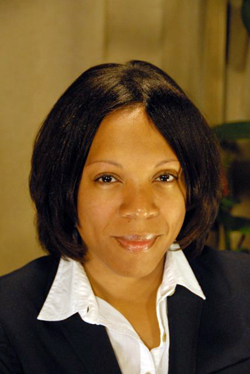Meet Our 2010 Graduates
Six for the road
From HIV/AIDS education in India to teaching children to read in Harlem , TC’s 2010 master’s and doctoral graduates have been there and done that. The following are profiles of a select group of this year’s graduates. To view videotaped interviews with a sampling of TC’s best and brightest, visit http://www.tc.columbia.edu/7518 .
Dennis Chambers, Ed.D., Adult Learning and Leadership, and TC Security Officer
During his many years at Teachers College, Dennis Chambers has seen TC in all its modes: the nighttime TC, the weekend TC, TC in summers and TC when students are on break.
But few at the College know Dennis Chambers equally well.
Nearly everyone knows the unfailingly friendly, calm and gentle man in the security officer’s uniform who responds to daily crises, large and small. Many also know the dedicated student who this spring received his third degree from Teachers College—an Ed.D. in Adult Learning and Leadership, to go with his master’s degrees in Health Education and Organizational Psychology.
What may be less well-known is that:
• Together with his wife, Sharon, who also holds a degree from Teachers College, Chambers is the founder and guiding spirit of Zen Masters, an after-school program in Queens that provides kids with homework assistance and teaches them life skills through martial arts.
• Chambers has served as an adjunct professor at Brooklyn College
• Chambers also has co-chaired numerous high-profile committees at TC.
As an African American male who inhabits all these different roles, Chambers thinks a lot about the ways in which people do and do not see him. He tells powerful stories—like the time, after 9/11, when, having just come off shift and with no time to change, he attended class in his uniform, and a student said, “Oh, are we going to have security with us all the time now?”
Or about the candidate for a high-level administrative position who treated him rudely at the front desk, only to come face to face with him as her interviewer later that day.
In fact, Chambers has found the issues of identity, race, perception and possibility so compelling that he has ended up writing his doctoral dissertation on the experiences of African American males pursuing doctoral degrees and how they perceive those experiences. One of his major findings was connected to what Columbia Provost and psychologist Claude Steele calls “stereotype threat”—the potentially limiting and damaging effects of others’ perceptions on those of color or from other quote-unquote minority backgrounds.
Chambers says he is grateful to faculty members he has worked with at TC—especially Maria Volpe, Victoria Marsick and Barbara Wallace—for seeing him not only for who he is, but who he can be, and for encouraging him in his work. He is proud that, at TC’s doctoral ceremonies, not only his family but also so many students from Zen Masters saw Master Dennis walk the talk. He doesn’t yet know what the future will hold. But from a man who says he believes that “teaching is love,” it seems likely that helping others will continue to be a major part of the plan.
Henan Cheng, Ed.D., International Educational Development
Until five years ago, the law in China China
Henan Cheng, who has received her TC doctoral degree in International Educational Development, with a concentration in finance and planning, is not the daughter of migrant workers, but she feels a kinship with them. Cheng was born in central China , in Henan Province ; grew up in another area when her parents were sent by the government to help build an automobile factory; attended college in Sichuan Province ; worked as an engineer in Hubei Province , earned an economics degree in Beijing , taught in Guangzhou , and then came to the United States
“I’m passionate about my research because this is not just an educational problem, it’s a social justice issue,” she says. “After 30 years of economic reform in China Confucius , China
Cheng made two trips back to China for her dissertation, spending several months conducting interviews, focus groups and school visits in Kunming , the capital of Hunan Province , a region in China ’s southwest that borders Vietnam , Laos and Myanmar
Among her most significant findings: concentrating large numbers of migrant worker children in a given school is damaging to the academic performance of all children in the school. And, conversely, that high levels of total school spending correlate with higher student academic achievement.
“The question of education for the children of migrant workers is a very serious social issue, and with such a large population it will have a huge impact on society,” says Cheng, who has accepted a position for the coming fall as a clinical assistant professor at Loyola University in Chicago
Lauren Fox, M.A., Sociology and Education
As a child Lauren Fox experienced first-hand the court-ordered racial integration of public schools in Charlotte , North Carolina
As a white student bused across town to integrated magnet schools in Charlotte
Charlotte was known in those days as a national model following a 1971 U.S. Supreme Court decision that had required the city to integrate its schools. But in 2000, when Fox was a sophomore in high school, the Supreme Court declined to review a lower court’s decision to lift the mandate. The Charlotte-Mecklenburg school district stopped using racial enrollment quotas and began its return to a neighborhood-based—more segregated—school system. As she later discovered in her work with Professor Amy Stuart Wells at TC, Fox had seen as a high school student the beginning of a national trend to dismantle court-mandated desegregation plans.
Fox’s master’s thesis in the Sociology and Education Program documents and analyzes the resegregation of her hometown schools and puts that trend in national context. She examines the consequences of redirecting education policy away from inputs in schools, such as the racial and ethnic make-up of the student body, to outputs such as test scores. “I wanted to take a look at the broader ideological changes that accompanied this shift towards policies which promote resegregation,” she says.
Also at TC, Fox has worked with Wells and three other master’s students on a large project, funded by the Ford Foundation, which, in her words, is attempting to “create a new common sense and public understanding surrounding issues of inequality, with the goal of garnering more widespread support for stronger social justice policies.” Fox is part of a team that is looking at past research and public knowledge surrounding issues of inequality. Her fellow Sociology and Education graduates, Melissa Barragan and Kathy Hill, as well as master’s student Joe Luesse, are also working with Wells on the project.
Fox is also part of Wells’ research project in Long Island and New York City, conducted through the Center for Understanding Race and Education, where she recently helped to write a paper based on interviews with students about how academic tracking—seen by some educators as supporting segregation within schools—has influenced their perceptions of their own academic abilities and success. Fox presented the findings with other members of her team at the annual meeting of the American Education Research Association in Denver
Fox plans to stay at TC and pursue her doctorate beginning in the fall. “The projects that I’ve been working on here, I couldn’t imagine leaving,” she says. “I am so excited to keep working with the Ford project. I think we’re on the brink of something really big in terms of shifting public knowledge and, hopefully, public policy.”
Janice Kim, M.A., Elementary Inclusive Pre-Service Education
During her first field placement, in a first-grade classroom of English language learners in Washington Heights
Kim’s focus is on working with special education students, a group she says “gets the least proper care and needs it the most.” In her second student placement, at P.S. 6 in Manhattan
“It was great to see how they included students with IEPs [individualized education plans],” she says. “Other teachers often put those students in separate groups, but these two teachers switched things up so much that none of the students really knew who had an IEP. And that’s what I loved about the program at TC. It really stresses that every child has a strength and also has areas they can work on.” For Kim, that idea was vividly illustrated in her Washington Heights
“There was this little boy who was the shortest child in the class and also a selective mute. He was very intelligent but his attitude towards school was very resistant, partly because of the way adults approached him. I tried to build a good rapport with him. In group meetings on the rug, I’d call on him. It took him time to talk, and the others would get restless, but I’d tell them to wait. I think he saw that, and it created a bond between us.”
On her last day on the job, Kim asked if any of the students wanted to get up and read a poem aloud to the class.
“This boy raised his hand, stood up and read it all aloud, with no help from me. I was just beaming. You could see that the other kids didn’t look at him differently, it was just the adults. And I’m hoping from that experience that the adults will change their view of him.”
Joe Rogers, M.A., Education, Leadership, Policy and Politics
As an eighth grader in Gray , Maine
“I was in a class for gifted and talented students, and I saw that so many of my schoolmates didn’t have the same access to experiential hands-on activities and that didn’t seem right to me,” recalls Rogers, who has received his master’s degree in Education Leadership, Policy and Politics. “Through conversations with Mrs. O’Wril, my English teacher and oratorical coach, I realized there were broader systemic issues that we, as a nation, needed to address.”
Rogers has been addressing them ever since, calling in particular on a self-professed talent for “bringing folks together to problem-solve and strategize.” He has tutored in inner-city Washington, D.C., where “kids in the nation’s capital, literally in sight of Congress, are receiving almost a third-world education”; launched and run an AmeriCorps program that provided adults with instruction in English as a second language, preparation for attaining a GED degree and family literacy skills; served as a program associate with New Visions for Public Schools, co-facilitating a process for sharing libraries in buildings that house multiple small schools; and consulted with the New York Mission Society, helping to improve and leverage dialogue among community leaders about education. He now serves as Director of Policy and Civic Engagement for Education Voters of New York, one arm of which engages New Yorkers around educational issues and policy reform while another functions as a political action committee, endorsing candidates committed to strengthening the public schools.
“Civic engagement is critical to educational equity,” he says. “Too often it’s the so-called policy elites making the decisions at 20,000 feet and missing the opportunity to inform policy through the experiences and views of everyday citizens. My principal interest is to engage the communities most impacted by education policy, helping them play a substantive and meaningful role in crafting it and shaping the educational landscape.”
Another of Rogers
At TC, Rogers
“Educational equity is my goal and my passion, and I’ll do whatever maximizes my impact,” he says. “If I ever felt I could make a greater impact as a legislator, I’d consider it.”
Virginia L. Thompson, Ed.D., Mathematics Education
Numbers loom large in Virginia L. Thompson’s life.
Thompson is the youngest girl among 11 siblings—the last to leave home and the first to complete a doctoral degree in higher education. She is married and the mother of three children—her youngest born on May 20, 2009, the day she was supposed to be getting the doctoral degree it had taken her seven years to complete.
But most of all, Virginia L. Thompson is a mathematics educator—a substitute assistant professor of mathematics and computer sciences at CUNY York College who believes that technology can be used as tool to help students discover mathematical concepts and achieve high performance results.
Thompson was always aware of her own mathematical ability, but as a teenager in high school was allowed to opt out of taking math courses in favor of a program that let her alternate weeks in school with weeks working a job. When she arrived at college—also at York
For her TC dissertation, Thompson surveyed nearly 100 calculus and pre-calculus students and numerous faculty members at a local college on their experiences with computer algebra systems—software that, like a very sophisticated calculator, can perform algebraic manipulations.
“It’s a tool that lets students relax a little on the math itself, because the system is doing the math for you and enables you to focus more on problem-solving type questions,” she says. “At the same time, you can use it to practice math concepts you haven’t yet mastered.”
She found that while most of the students liked the tool, and were comfortable learning with technology, few used it in answering questions. Thompson also discovered that no two professors teaching sections of the same course were in fact teaching the same content, nor did they have similar teaching styles.
Perhaps as a result, only one student among all those Thompson surveyed was able to solve a group of standard pre-calculus problems successfully. Her conclusion? The technology is good, but teachers must review seminal research literature, and work with educators who have walked the same path and are capable of guiding decision making and the appropriate use of technology in the classroom.
Thompson credits her TC advisor, Erica Walker, and faculty members Bruce Vogeli and Henry Pollak, for guidance in her work and flexibility in helping her negotiate the many all-nighters required to write a dissertation while tending to three young children. Her love for math and experience at Teachers College, she says, “has inspired me to inspire others in and out of the classroom.”
Published Tuesday, Jun. 29, 2010
